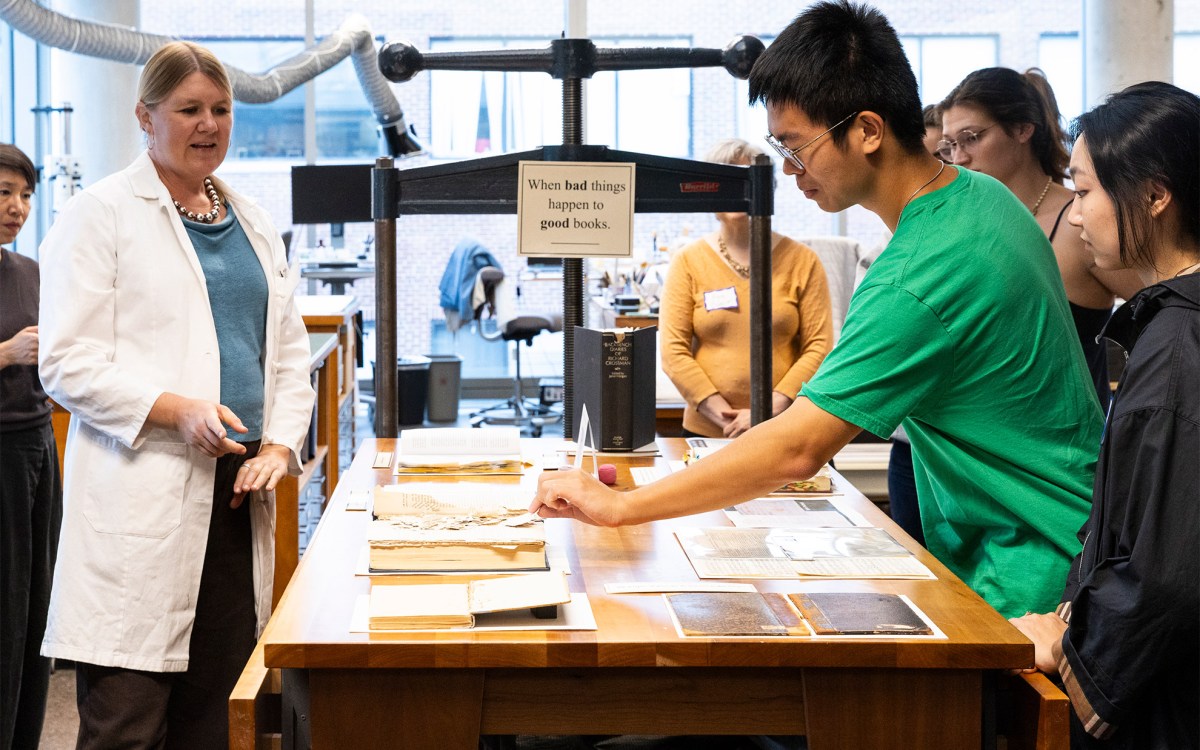Tag: Disease
-
Health
‘Death protein’ may lead to drugs that force cancer cells to self-destruct
Scientists at Dana-Farber Cancer Institute have identified a previously undetected trigger point on a naturally occurring “death protein” that helps the body get rid of unwanted or diseased cells. They say it may be possible to exploit the newly found trigger as a target for designer drugs that would treat cancer by forcing malignant cells…
-
Health
Cooper: Doctor-patient relations cause health disparities
In the United States, a black man can expect to die, on average, 10 years earlier than his white counterpart. For black women, that racial gap in life expectancy is five years.
-
Health
Major step forward in cell reprogramming
Imagine, if you can, a day within the next decade when a physician-scientist could remove a skin cell from your arm and with a few chemicals turn that fully formed adult cell into a dish of stem cells genetically matched to you.
-
Health
Study shows what smokers need to stay clean
Hospital-sponsored stop-smoking programs for inpatients that include follow-up counseling for longer than one month significantly improve patients’ ability to stay smoke-free. An analysis of clinical trials of programs offered at hospitals around the world finds that efforts featuring long-term support can increase participants’ chances of success by 65 percent.
-
Health
Genetic ‘fingerprint’ shown to predict liver cancer’s return
Scientists have reached a critical milestone in the study of liver cancer that lays the groundwork for predicting the illness’s path, whether toward cure or recurrence. By analyzing the tissue in and around liver tumors, an international research team has identified a kind of genetic “fingerprint” that can help predict whether cancers will return.
-
Campus & Community
Kuwait Program accepting grant proposals
The Harvard Kennedy School (HKS) has announced the 15th funding cycle for the Kuwait Program Research Fund, which is supported by the Kuwait Foundation for the Advancement of Sciences (KFAS). An HKS faculty committee will consider applications for one-year grants (up to $30,000) and larger grants for more extensive proposals to support advanced research by…
-
Campus & Community
HUHS to offer flu vaccination clinics throughout October
Harvard University Health Services (HUHS) will conduct free high-risk flu vaccination clinics throughout the month of October. The clinics will be held for all high-risk individuals every Monday and Tuesday (noon-3 p.m.) at HUHS on the second floor of the Holyoke Center (Monks Library). Students must have their Harvard ID to receive the vaccination.
-
Health
Study examines association between caffeine, breast cancer risk
Caffeine consumption does not appear to be associated with overall breast cancer risk, according to a report in the Oct. 13 issue of Archives of Internal Medicine, one of the JAMA/Archives journals. However, there is a possibility of increased risk for women with benign breast disease or for tumors that are hormone-receptor negative or larger…
-
Campus & Community
Smoking, burning solid fuels in homes in China projected to cause millions of deaths
If current levels of smoking and of burning biomass and coal fuel in homes continues in China, researchers estimate that between 2003 and 2033, 65 million deaths will be attributed to chronic obstructive pulmonary disease (COPD) and 18 million deaths to lung cancer, accounting for 19 percent and 5 percent of all deaths in that…
-
Campus & Community
Harvard-affiliated gene study receives NIH funding
Two Harvard Medical School (HMS) professors of ophthalmology are co-principal investigators of a gene project that has received funding by the National Institutes of Health (NIH). Lou Pasquale and Janey Wiggs, both glaucoma researchers at the Massachusetts Eye and Ear Infirmary, are leading the grant-winning team of researchers that includes Vincent L. Gregory Professor in…
-
Health
Advance in pluripotent cell creation
A team of Harvard Stem Cell Institute (HSCI) scientists has taken an important step toward producing induced pluripotent stem (iPS) cells that are safe to transplant into patients to treat diseases. Excitement over the ability of researchers to create this form of stem cell by inserting four genes into adult cells has thus far been…
-
Health
New approach to gene therapy may shrink brain tumors, prevent their spread
Massachusetts General Hospital (MGH) researchers are investigating a new approach to gene therapy for brain tumors — delivering a cancer-fighting gene to normal brain tissue around the tumor to keep it from spreading. An animal study described in the journal Molecular Therapy, the first study to test the feasibility of such an approach, found that…
-
Campus & Community
HSPH expands HIV/AIDS work in Tanzania
Nearly 150 years ago, the Tanzanian city of Dar es Salaam was known by another name — Mzizima, meaning “healthy town” in the local language. But over the decades, the city and the country of Tanzania have experienced mounting challenges to that health.
-
Health
HMS/MGH’s Bruce Walker presents update on vaccine progress
Bruce Walker recalls sitting across from a person long-infected with HIV who never took antiretroviral drugs and never developed AIDS. Walker remembers thinking that the person’s body held a secret of which even they were unaware: how to stop the global AIDS pandemic.
-
Health
Stem cell summit hails bench progress, looks to bedside future
New discoveries concerning cell reprogramming over the past year have boosted stem cell researchers in the lab and encouraged efforts to transfer test tube and lab animal advances to humans suffering degenerative diseases such as diabetes, Parkinson’s disease, and Lou Gehrig’s disease.
-
Campus & Community
Thomas Weller, Nobel laureate, HSPH professor emeritus, dies at 93
Thomas H. Weller, a Nobel Prize winner in 1954 and Harvard School of Public Health (HSPH) professor emeritus, passed away on Aug. 23. He was 93.
-
Health
HPV, cervical cancer link earns scientists Alpert Prize
Two scientists who discovered that specific types of human papillomavirus, or HPV, cause cancer of the cervix received the 20th annual Warren Alpert Foundation Scientific Prize on Sept. 15. As part of the day’s celebration, the prize winners Harald zur Hausen and Lutz Gissmann — both professors at the German Cancer Research Center in Heidelberg…
-
Campus & Community
HMS’s VanRooyen earns Humanitarian Award
At its annual dinner on Sept. 5, the Hippocrates Society honored Harvard Medical School Associate Professor of Medicine Michael VanRooyen with the 2008 Humanitarian Award. VanRooyen, who is also associate professor in the Department of Global Health and Population at the Harvard School of Public Health (HSPH), was recognized for his extensive work in humanitarian…
-
Campus & Community
HSPH honors Bernard Lown
A professorship and scholarship program to honor the career of Bernard Lown in advancing public health is being established at Harvard School of Public Health (HSPH). School officials made the announcement Sept. 10.
-
Health
Cutting in on the AIDS-TB death dance
On a hill in South Africa’s KwaZulu Natal province, near the hall where Nelson Mandela delivered his last speech before prison and the station where Mahatma Gandhi was tossed off a train to begin his life’s work, stands Edendale Hospital.
-
Health
Three hours at Nohana
“I just want to see how bad things are in the clinic,” Jennifer Furin said. “It’s a ‘doctor fear’ that someone is bleeding out while I’m standing here eating chocolate.”
-
Campus & Community
Edward ‘Ted’ W. Webster
Edward (“Ted”) W. Webster, Ph.D., 83, Professor Emeritus of Radiology (Physics) Harvard Medical School (HMS), passed away on Saturday, December 17th, 2005. He will be remembered both for his many scientific contributions and his friendly, warm and supportive manner.
-
Campus & Community
HMS’s Bruce Walker to speak on AIDS epidemic
The Program for Evolutionary Dynamics will present a lecture by Bruce Walker, professor of medicine at Harvard Medical School on, Sept. 19 at 2:30 p.m. in the Science Center lecture hall. The title of the talk is “The AIDS Epidemic: Immune Selection Pressure, Viral Evolution, and Prospects for a Vaccine.” The talk is free and…
-
Campus & Community
Driven to succeed
When the baby vomited again, Gail Melton knew something was seriously wrong with her second child, a son she and her husband, Doug Melton, had named Sam. She phoned Doug and took Sam to Harvard Health Services in Holyoke Center. Doug hurried to the clinic from his Fairchild Biochemistry Building lab on Divinity Avenue. Together…
-
Campus & Community
HBS team wins big — and twice
A Harvard Business School class, a 12-year-old competition, and the collaboration of some of the University’s sharpest scientific and business minds have yielded a company that could save countless lives. A six-member team recently won both the Harvard Business School (HBS) and the Massachusetts Institute of Technology (MIT) business plan contests for their work on…
-
Campus & Community
Eli and Edythe Broad make unprecedented gift
Los Angeles-based philanthropists Eli and Edythe Broad on Sept. 4 declared the Broad Institute of Harvard and MIT an unprecedented success as an experiment in science and philanthropy and announced that they have increased their total gift to the Broad by $400 million to $600 million. The $400 million will be an endowment to convert…
-
Campus & Community
Broad awarded $86M NIH grant to develop chemical probes for disease
Researchers at the Broad Institute of Harvard and MIT have been chosen to receive a six-year, $86 million grant from the National Institutes of Health (NIH) to identify and develop molecular tools known as “small molecules,” which can probe proteins, signaling pathways, and cellular processes that are crucial to human health and disease.
-
Health
HSCI researchers see major breakthrough
In a feat of biological prestidigitation likely to turn the field of regenerative medicine on its head, Harvard Stem Cell Institute (HSCI) co-director Doug Melton and postdoctoral fellow Qiao “Joe” Zhou report having achieved what has long been a dream and ultimate goal of developmental biologists — directly turning a fully formed adult cell into…
-
Health
When genetics gets personal
Just five years after the Human Genome Project announced it had decoded the first human DNA, the era of personal genetics is dawning, bringing with it not just the promise of targeted, personalized medicine and a new level of self-knowledge, but also a host of ethical, legal, and practical issues. A new project out of…


